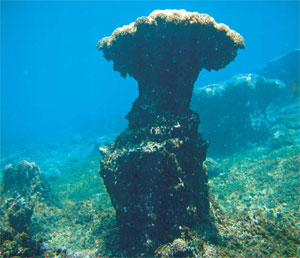More bad news for coral reefs: climate change will increase chance of erosion
Climate change will increase the erosion of coral reefs
Jeremy Hance, mongabay.com
July 28, 2008
Coral reefs are particularly susceptible to climate change. Warming waters have been shown to bleach coral, killing off symbiotic algae that provide them with sustenance, and often leading to the death of the coral itself. Much attention has been placed on bleaching coral, but now scientists have discovered an additional danger to coral reefs in a warming world: erosion.
A study published in this week’s issue of PNAS has shown that coral reefs in the waters off Panama and Galapagos, which live in a naturally acidic and high CO2 environment, contain dangerously low percentages of cement to hold them in place. The researchers believe that these reefs are a vision into the future of reefs worldwide, since their environment replicates the expected increased in acidity and CO2. Oceans have already absorbed about one-third of all carbon dioxide released into the atmosphere since the industrial revolution.
 Heavily bioeroded coral reef framework structure from eastern tropical Pacific Ocean. Photo taken at Dog Island Reef, Secas Islands, Gulf of Chiriqui, Panama. Image courtesy of T. B. Smith. |
The researchers believe that early marine cementation is key to a coral reefs “rigidity and stability”. Studying early marine cementation in three test sites, one in Galapagos and two in Panama, the researchers searched interskeletal pores for evidence of cementation. They found that cementation was in 1.5 to 16.1 percent of these reef’s pores. The Galapagos was the most cement-free with six samples showing no cement whatsoever. The researchers also took samples from a reef in the Bahamas. In these less acidic and less CO2-rich waters, 60 percent of coral contained cementation: four times more than the most cement-rich coral found by scientists in the waters off Panama. Bearing out the link between less cementation and risk of erosion, the scientists note that erosion rates in the Galapagos and Panama “are among the highest measured for any reef system to date”.
Coral reefs are bombarded by threats. A recent study from the IUCN showed that nearly one in three coral species in the world are endangered. Threats included human disturbance, coastal development, sedimentation from land erosion and deforestation, high nutrient run-off from agriculture causing algae blooms, over-fishing, and bleaching due to warming oceans. This new study reveals yet another vulnerability, the increasing instability of reefs in face of climate change.
“Poorly cemented coral reefs of the eastern tropical Pacific: Possible insights into reef development in a high-CO2 world,” by Derek P. Manzello, Joan A. Kleypas, David A. Budd, C. Mark Eakin, Peter W. Glynn, and Chris Langdon. PNAS.
Related articles
Climate change will increase the erosion of coral reefs
(7/28/2008) Coral reefs are particularly susceptible to climate change. Warming waters have been shown to bleach coral, killing off symbiotic algae that provide them with sustenance, and often leading to the death of the coral itself. Much attention has been placed on bleaching coral, but now scientists have discovered an additional danger to coral reefs in a warming world: erosion.
Coral susceptibility to bleaching due to small differences in symbiotic relationship
(7/22/2008) Coral reefs are now considered the second most threatened group of animals in the world, with nearly one-third of corals listed as endangered (amphibians retain the dubious honor of being number one). Although corals face many threats, the greatest is bleaching caused by warming oceans due to climate change. However, some coral populations are more susceptible to bleaching than others, even including corals of the same species. New research has uncovered that the reason lies in small differences in the symbiotic relationship between corals and their symbionts, small marine animals and protozoa. Such differences, however miniscule, have a huge impact on the likelihood of a coral’s ability to survive warming oceans.
Moving species may be only way to save them from climate change
(7/17/2008) Desperate times call for desperate measures, according to a new paper in Science. conservation scientists from the US, the UK, and Australia are calling for the consideration of a highly controversial conservation technique: assisted migration. According to the policy piece, species would be relocated to sites “where they do not currently occur or have not been known to occur in recent history”.
1/3 of corals face extinction
(7/10/2008) Nearly one-third of reef-building corals are vulnerable to extinction, according to an assessment of 845 species of coral. Rising temperatures, increased incidence of disease, and human disturbance are driving the trend.
U.S. coral reefs in trouble
(7/7/2008) Nearly half of U.S. coral reefs are in “poor” or “fair” condition according to a new study by the National Oceanic and Atmospheric Administration (NOAA).














